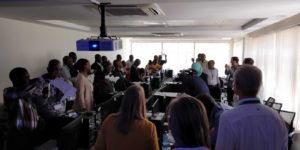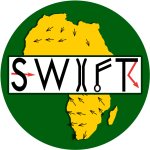Prepared by Elisabeth Thompson, Linda Hirons, Felipe Andrade and Steven Woolnough
From the 18th to the 22nd November, 32 people from more than 20 organisations came together at the new headquarters of the IGAD Climate Prediction and Applications Centre in Ngong Town, Nairobi for the Kick-off meeting of a two year Sub-seasonal to Seasonal (S2S) Forecasting Testbed. The gathering was made up of research scientists, forecasters and users and was designed to initiate dialogue and planning for new co-produced sub-seasonal real-time forecast products to support decision making processes. The event was held concurrently with the ForPAc and WISER Phase 2 Support to ICPAC (W2-SIP) foundational climate science and services training workshop, which enabled collaboration between several international organisations also working with sub-seasonal information.
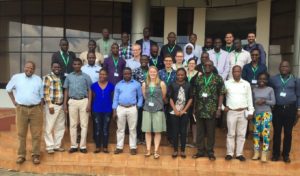
The week-long participatory meeting included an overview of the co-production process with facilitated country level discussions between forecasters, scientists and users on co-exploring needs, co-developing solutions, co-delivering solutions and evaluation, as well as cross-country sessions to share experiences from throughout the region. On the technical side of product development, the week also included an introduction to the operational framework for Tropical Applications of Meteorology using SATellite data and ground based measurements-AgricuLtural EaRly warning sysTem (TAMSAT-ALERT) and an introduction to the JASMIN computing infrastructure and the real-time sub-seasonal data.
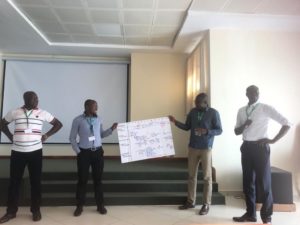
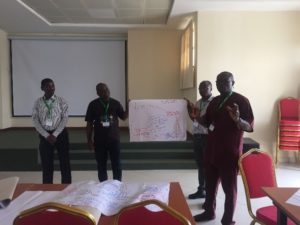
With the material and discussion output from the kick-off meeting, participants will develop work plans for the two-year co-production of real-time S2S forecast products, which includes specific information on communication, timing, dissemination, evaluation and feedback strategies, as well as a commitment to meet regularly throughout the need two years in order to implement these strategies.
The kick-off event was a hugely successful week thanks to the enthusiastic engagement from all the participants, and the wonderful hospitality and facilities of our ICPAC hosts. It is an exciting time to be part of the African-SWIFT S2S work package as we look forward to working towards developing our science into applications, and we left the meeting full of enthusiasm for the coming two years.
